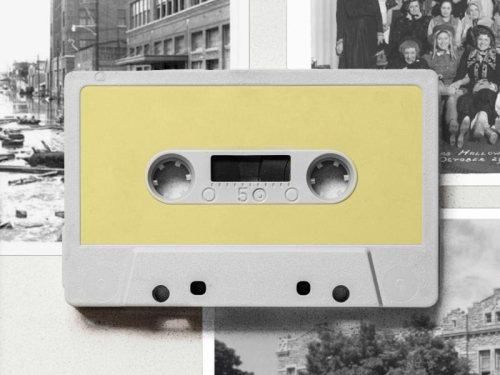‘Speaking of Kansas City’ Brings Stories Together on One Site

The Garment District. The 1951 flood. The Kansas City School District. Charlie Parker.
These topics and more are all featured on a new Library website called Speaking of Kansas City, a regional oral history collection with more than 270 audio and video recordings from 1970 to 2018.
"The initial group of recordings was developed with an eye toward diversity, and our partner organizations helped us make that happen,” says Digital Branch Manager David LaCrone. “In the coming years, we will continue to expand the viewpoints and topics that are represented in the collection."
Current partners are area libraries, archives, and cultural institutions, including Black Archives of Mid-America, the Kansas City Museum, the Midwest Center for Holocaust Education, and the Nelson-Atkins Museum of Art.
For more than 50 years, the Library and partner organizations have gathered audio and video recordings of residents from all walks of life. Some recordings focused on specific groups, such as Latinos, African Americans, women, LQBTQ, political figures, veterans, and activists for justice and equal rights.
“One of the greatest challenges in local history is removing barriers that prevent people from accessing diverse primary resources,” says Digital History Specialist Jason Roe. “Many of the recordings remained in physical format on archives’ shelves and rarely viewed.”
The first phase of the project focused on converting CDs, cassettes, and DVDs to web-friendly formats. Previously, many of the recordings were only available to on-site researchers.
The collection features nearly 60 audio interviews with longtime Westside residents conducted by Irene H. Ruiz in the 1970s and ’80s, as well as business owners and community leaders discussing their involvement with the Hispanic Chamber of Commerce.
Recordings also include video interviews with former residents of Steptoe, an African American neighborhood near Westport, and more than 50 interviews dating back to the 1970s with other notable African American residents, including Alvin Brooks, Emanuel Cleaver, Ollie Gates, and Mamie Hughes.
Local veterans share personal stories about their experiences, and Holocaust survivors provide testimonies.
Now, patrons can listen to or watch recordings directly on the Speaking of Kansas City website – and access the full-text transcripts.
“It is so exciting to see these recordings alongside one another in a single platform,” says LaCrone. “The public will no longer need to visit multiple locations or websites to hear these powerful stories.”
In a 1976 audio interview from the Black Archives, jazz musician Ahmad Alaadeen described his brother taking him to listen to live music at the age of four or five.
“I was introduced to music at a very early age,” recalled Alaadeen. “When I was staying on 10th and Vine I met Jay McShann, who was one of the top groups back in the late ’30s and early ’40s, maybe three or four doors down from me. At that time, the great Charlie Parker was in the band.”
A 2011 video interview with artist Linda Lighton is drawn from the Library’s Garment Industry Oral History Collection. Lighton’s father, Alfred Lighton, was Herbert Woolf’s nephew and served as the last president of Woolf Brothers, the Kansas City-based clothing company.
“He was really dashing. He was into horses. He ran the store,” Lighton said of Woolf. “He was the first man to ever think of using a plane for shipping things from store to store. And so, he was considered an incredibly dynamic businessman.”
“The launch of Speaking of Kansas City,” says LaCrone, “is just the beginning.”
He adds, “Our hope is that more organizations who want to make their recordings available to the public will come on board and help us build upon the rich and diverse collection we have today.”
The Hall Center for the Humanities at the University of Kansas provided support for the project in partnership with KU’s Institute for Digital Research in the Humanities via the Stories for All program, with funding from the Andrew W. Mellon Foundation. Additional support was provided by the Institute of Museum and Library Services.